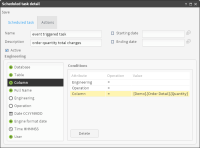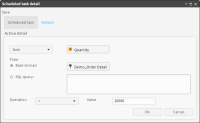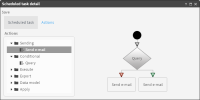Using a conditional query to automate actions
Action properties support associating specific actions with defined trigger event conditions. Automating a notification process provides a basic example for associating event-triggered, scheduled tasks and unique trigger events. A basic example demonstrating how to define unique actions that result from evaluating a conditional query follows.
The following example task generates one of two unique email message actions based on evaluating an order quantity in a customer database.
How to specify actions based on query results
1 In a scheduled task, create an event trigger having conditions that monitor the customer order table:
1 In Trigger for task, expand BIRT Analytics. Then drag and drop an Engineering event type in the scheduled task editor.
2 In Scheduled task detail—Scheduled task, define conditions and attributes that identify a specific column, as shown in
Figure 8‑11.
Figure 8‑11 Defining specific conditions for a scheduled task
2 In Actions for the event-triggered task, expand Conditional. Drag Query and drop it in the visual editor.
3 Specify query conditions for an action using Action details. For example, the selections shown in
Figure 8‑12 compare a quantity in a specific field with a defined value. The result returned by the conditional query is Yes or No. Choose OK.
Figure 8‑12 Specifying query conditions for an action
4 In Actions, add two Send email actions, using the visual editor, as follows:
1 Expand Sending. Drag and drop a Send email action on Query. Choose Yes.
2 Configure details for an email message action, appropriate for a Yes result.
3 Drag and drop another Send email action on Query.
4 Configure details for an email message action, appropriate for a No result.
5 Two Send email actions appear, one for each query condition, as shown in
Figure 8‑13.
Figure 8‑13 Examining a conditional query and associated actions
6 Choose Save.
Related topic
Video Tutorial



